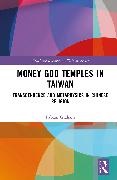Ulteriori informazioni
This book traces the history and development of Taiwan's new money god tradition, where, by borrowing a small sum of blessed 'fortune money' and returning it with interest within a year, a temple's deity may intervene in the recipient's life, bringing them unearned good luck and good fortune.
Comprising an in-depth ethnography based on a decade of research, the book explores Taiwan's money god tradition, revealing its ritual culture and underlying beliefs, thoroughly analysed from sociological, comparative historical/geographic, Taoist, Buddhist, metaphysical, and philosophical contexts. Drawing on Taoist and Buddhist cosmology, Chinese afterlife beliefs, and a trust in the power of the gods to influence the material world, the narrative explores the subjective nature of luck and fate; of human desires, choices and decisions; and of individuals' subjective understandings of what the universe contains. These factors all contribute to the book's final question, which, through an exploration of human-deity interactions, investigates whether Jacques Derrida's true, un-reciprocal gift exists on a transcendent level amid the religious exchanges within Taiwan's money god tradition.
This will be a valuable resource for students and scholars of Chinese religion and Taiwanese culture, as well as those with an interest in East Asian philosophy and religion.
Sommario
Ethnography Money Gods, Gifts, and Conundrums 2. Taiwan's Most Popular Money Gods - History and Mythology 3. Fortune Money - The Beginnings 4. Fortune Money - Other Systems Fortune Money and the Taoist Priest - Shiding Wulu Caishen Miao
Part 2: Analyses 7. Intentionality, Numbers, and Trends 8. Societal Catalysts to Religious Change. Why Taiwan?
Info autore
Fabian Graham is an independent researcher & associate researcher in the 'Religion and Globalization' cluster, Asia Research Institute at the National University of Singapore.

